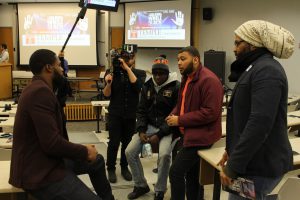
Before the beginning of my last semester at Temple Law, I braved a very cold, windy, and snowy day to take part in the screening of the documentary “Walking While Black: L.O.V.E. is the Answer.” The film attempted to take a balanced approach in discussing the deep-rooted problems in America when it comes to the distrust that many Black Americans have with law enforcement, and the dysfunctional relationship between the two. The film attempts to humanize the Black victims of injustices propagated by law enforcement by focusing on some of the incidents that have gotten a lot attention, and many that have not. The film also attempts to humanize members of law enforcement by using primary sources to give the viewer insight into what it’s like to be a member of law enforcement in this current criminal justice reform environment. Ultimately, the film ends with a call to action, for victims of injustices, their families and communities, to engage in a reconciliatory approach with members of law enforcement for the purpose of creating a relationship that is mutually beneficial.
In addition to showing some of the disturbing clips that have unfortunately led to too many hashtags, the film offered the testimonials of Black members of law enforcement. This, to me, was the most effective part of the film. I say that because they attempted to humanize themselves and their experiences to the audience. Their testimonies reminded me of a concept I read about long ago in W.E.B. Dubois’s book The Souls of Black Folks called “Dual Consciousness.” When speaking on this phenomenon, Dubois writes:
It is a peculiar sensation, this double-consciousness, . . . measuring one’s soul by the tape of a world that looks on in amused contempt and pity. One ever feels his two-ness – an American, a Negro; two souls, two thoughts, two unreconciled strivings; two warring ideals in one dark body whose dogged strength alone keeps it from being torn asunder.
Feelings of sadness, empathy, and anger arose when I watched as a Black federal agent discussed how during an investigation, a white woman did not believe he was law enforcement, despite showing his credentials, and called local law enforcement on him. Although I knew he was physically safe and sound, I could feel my adrenaline rise as if his story could potentially end the same way that Sandra Bland’s did—as a hashtag. In addition to having this unnecessary confrontation with the local police, the federal agent spoke candidly about what it is like to be Black in law enforcement, and called for reconciliation. To me, his story epitomized what I perceive what Dubois meant by “dual consciousness.” Here, a law enforcement officer, who was faithfully doing his job on behalf of the state, knows that he is still in real danger of losing his life by way of another law enforcement officer in the same unjust way any other Black person could. The pain and sadness that I felt through the screening of this Black man’s experience was the same feelings I have felt with my personal struggles with my own “dual consciousness.”
Next, the ACLU’s Bill Cobb; NFL Players Malcolm Jenkins, Torrey Smith, and Rodney McLeod; the Film’s producer Errol Webber; and a representative from the Philadelphia Police Department, Inspector Mike Cram, sat on a panel to discuss the film and the topic of criminal justice reform. I thought the panel was fruitful; and although all members on the panel agreed with criminal justice reform, each person had varying opinions on the matter.
I also thought it was amazing that a brother, who is a returning citizen from a long prison sentence, was in the audience, and discussed what he thinks should be done to fix the system. The crux of his comments were that, in addition to extensive changes through criminal justice reform, he wants to challenge the convicted to do better in their communities. I think his words were important and necessary to the discussion because often in privileged spaces like law schools, the voices of the less fortunate are often missing. These voices can bring clarity, help facilitate the reforms that we are pushing for, and can reorient policy discussion to focus on the people they are being crafted to help.
Finally, most of the panel agreed with the film’s call to action; which included using love as a tool for communities of color to reach out, forgive and engage with law enforcement for mutually beneficial reforms. While I agree with the spirit of this initiative, I think it can be best used as a conversation starter, but not as a cure-all. My cynicism is informed by the many times Blacks have attempted to go the route of reconciliation in American history, only to find ourselves on the receiving end of state-sponsored, or state-complicit, forms of violence.
Nevertheless, the screening and subsequent panel created the conditions in which a thoughtful and diverse conversation could take place. These long-standing and painful issues will not be solved by a single tool, but through a multivariate of initiatives that may include the one proposed by “Walking While Black: L.O.V.E. is the Answer.”



